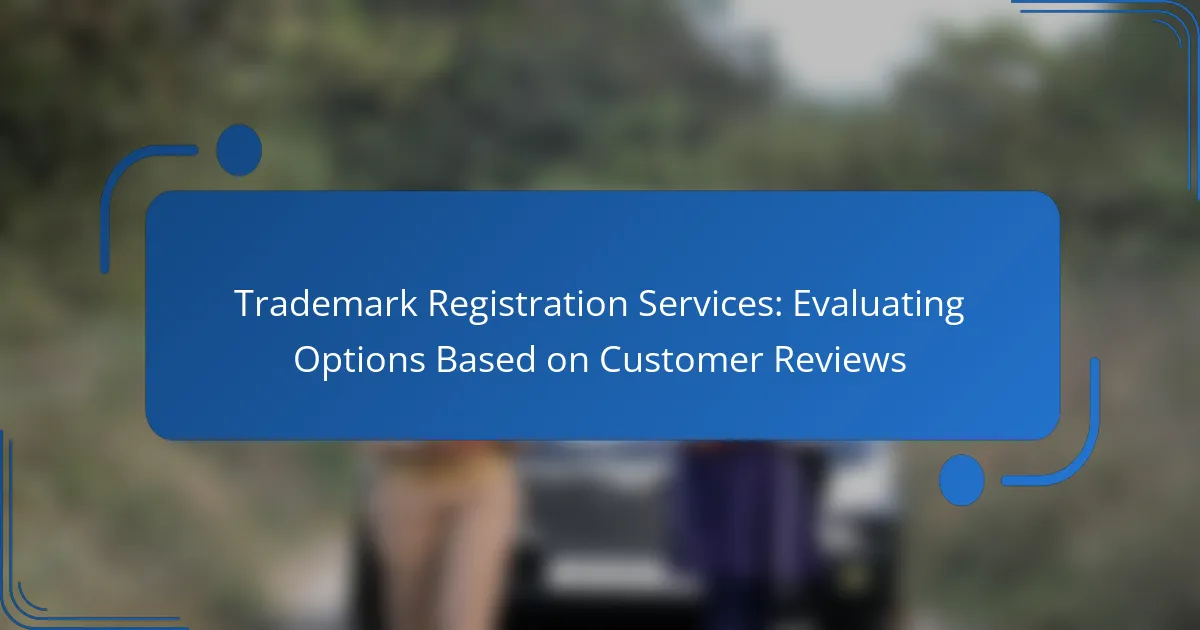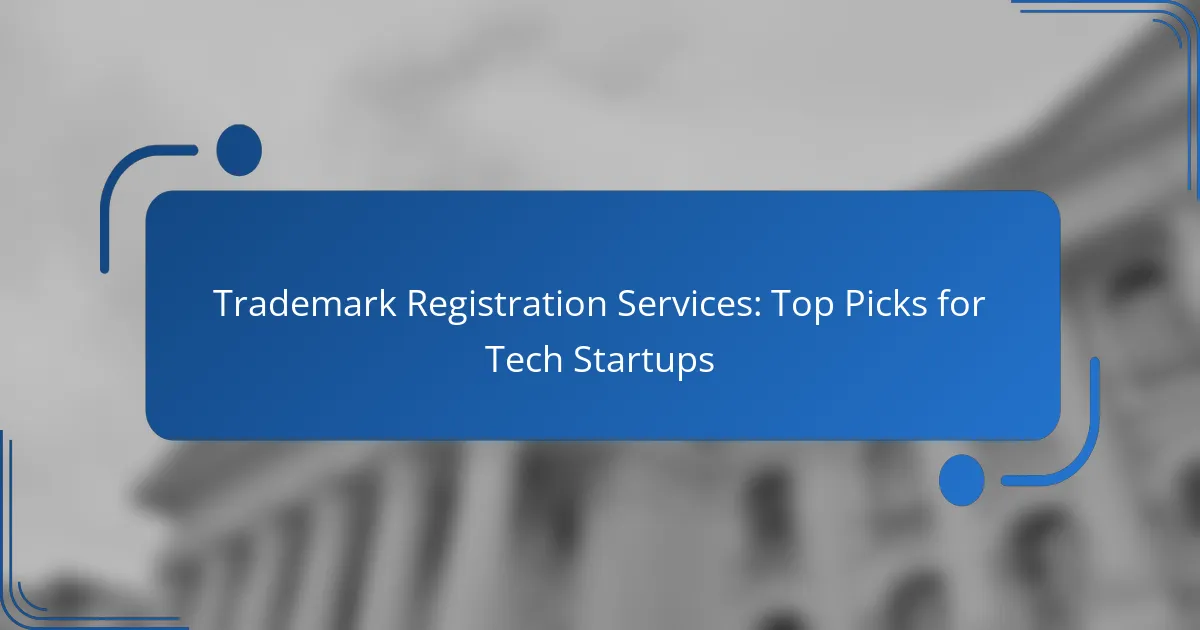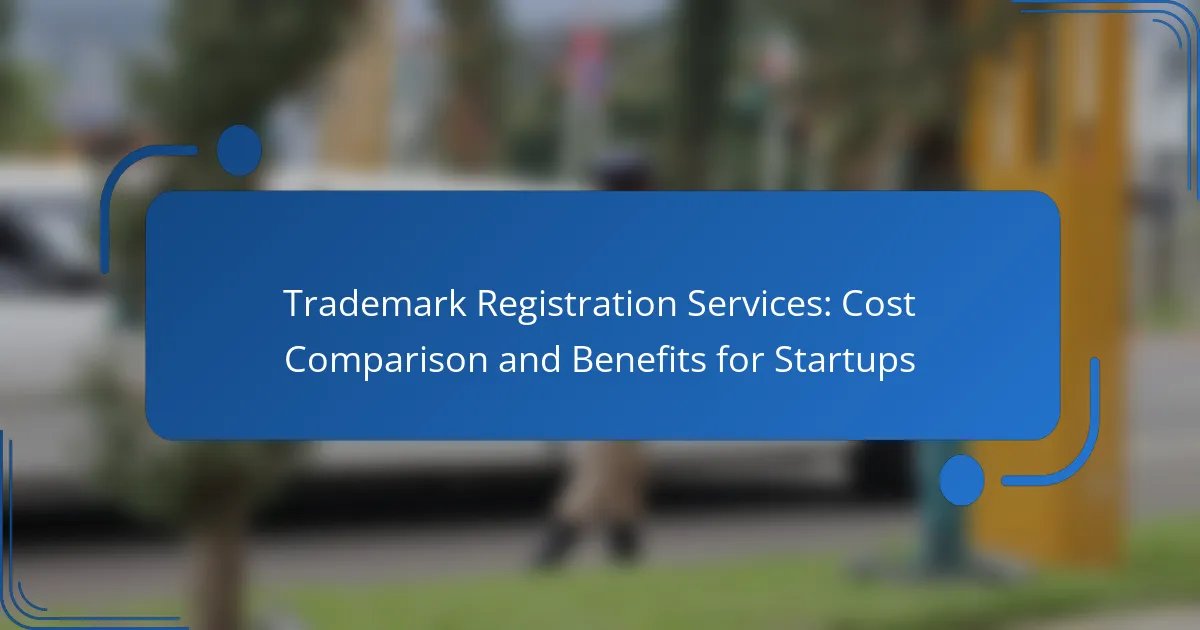For small businesses, selecting the right trademark registration service is crucial for protecting their brand identity while managing costs. These services provide essential guidance through the application process, making it accessible and straightforward. By evaluating specific needs and comparing features, entrepreneurs can find a solution that offers both comprehensive support and affordability.
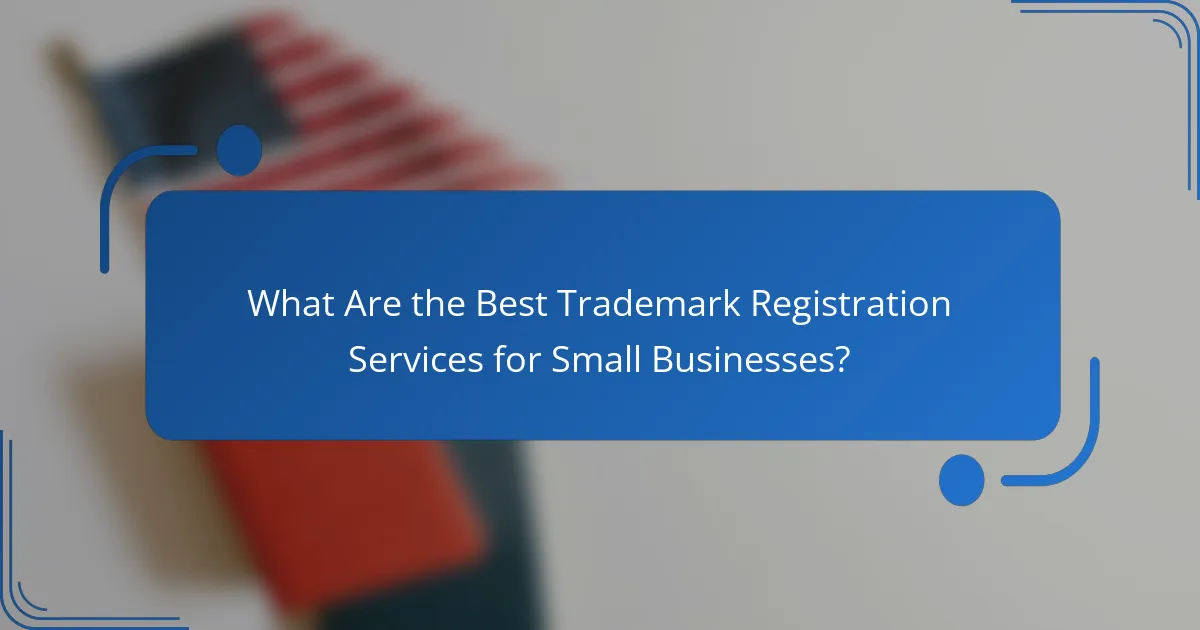
What Are the Best Trademark Registration Services for Small Businesses?
The best trademark registration services for small businesses offer a balance of affordability, ease of use, and comprehensive support. These services typically guide entrepreneurs through the trademark application process, ensuring that their brand identity is legally protected without overwhelming them with complex legal jargon.
LegalZoom Trademark Registration
LegalZoom provides a user-friendly platform for trademark registration, making it accessible for small business owners. Their service includes a trademark search to identify potential conflicts and a filing process that simplifies the paperwork involved.
Pricing typically starts in the low hundreds of USD, which includes basic filing services. However, additional fees may apply for more comprehensive support or expedited services.
Trademarkia Trademark Services
Trademarkia is known for its extensive database and search capabilities, which help users find existing trademarks that may conflict with their desired mark. The platform offers a straightforward application process and various packages to suit different needs.
Costs for Trademarkia’s services generally range from a few hundred to over a thousand USD, depending on the complexity of the trademark and the level of service chosen.
Rocket Lawyer Trademark Protection
Rocket Lawyer combines legal services with trademark registration, providing small businesses with access to legal advice throughout the process. Their service includes a trademark search and the option to consult with an attorney if needed.
Rocket Lawyer’s pricing is subscription-based, which can be economical for businesses that require ongoing legal support, with initial trademark registration costs starting around 200 USD.
IncFile Trademark Registration
IncFile focuses on helping startups and small businesses with their legal needs, including trademark registration. Their service includes a comprehensive trademark search and filing assistance, ensuring that clients understand each step.
IncFile’s pricing is competitive, often starting at around 149 USD for basic trademark registration, making it an attractive option for budget-conscious entrepreneurs.
Trademark Engine Services
Trademark Engine offers a streamlined process for trademark registration, featuring an easy-to-navigate interface. They provide a trademark search and assistance with filing, which is particularly beneficial for those unfamiliar with the process.
Pricing for Trademark Engine typically starts at about 199 USD, with additional fees for more extensive services. Their straightforward approach makes it a good choice for small businesses looking for efficiency.
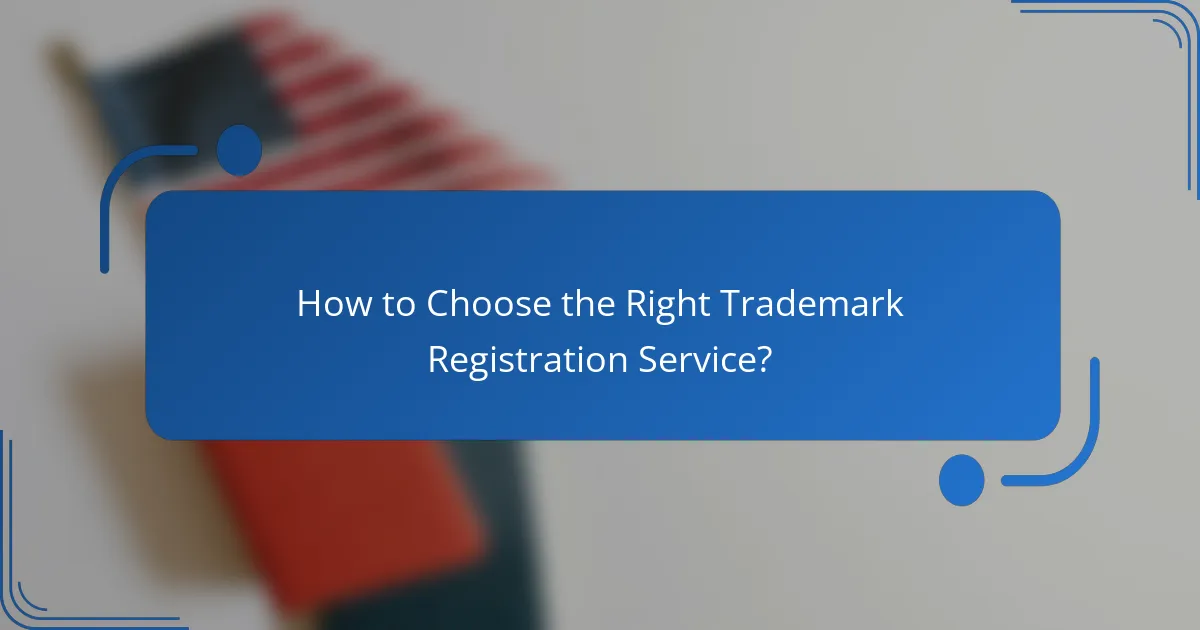
How to Choose the Right Trademark Registration Service?
Choosing the right trademark registration service involves assessing your specific needs, understanding the features offered, and comparing costs. Small businesses should prioritize services that provide comprehensive support while fitting within their budget.
Evaluate Service Features
When evaluating trademark registration services, consider the specific features they offer. Look for services that provide trademark searches, application filing, and monitoring for potential infringements. Some platforms also offer legal consultations, which can be beneficial for small businesses navigating the trademark process.
Additionally, check if the service includes educational resources or tools that help you understand trademark law. A user-friendly interface and customer support can significantly enhance your experience, making the registration process smoother.
Compare Pricing Structures
Pricing for trademark registration services can vary widely, so it’s essential to compare different options. Some services charge a flat fee for the entire process, while others may have tiered pricing based on the complexity of your trademark. Expect to pay anywhere from a few hundred to over a thousand USD, depending on the service level.
Be aware of any hidden fees, such as charges for additional classes of goods or services. A transparent pricing structure will help you avoid unexpected costs and ensure you stay within your budget.
Check Customer Reviews
Customer reviews can provide valuable insights into the reliability and effectiveness of trademark registration services. Look for feedback on the service’s responsiveness, ease of use, and overall satisfaction from previous clients. Platforms like Trustpilot or Google Reviews can be helpful in gathering this information.
Pay attention to recurring themes in the reviews, such as issues with customer service or delays in processing. This can help you make a more informed decision and choose a service that aligns with your expectations and needs.
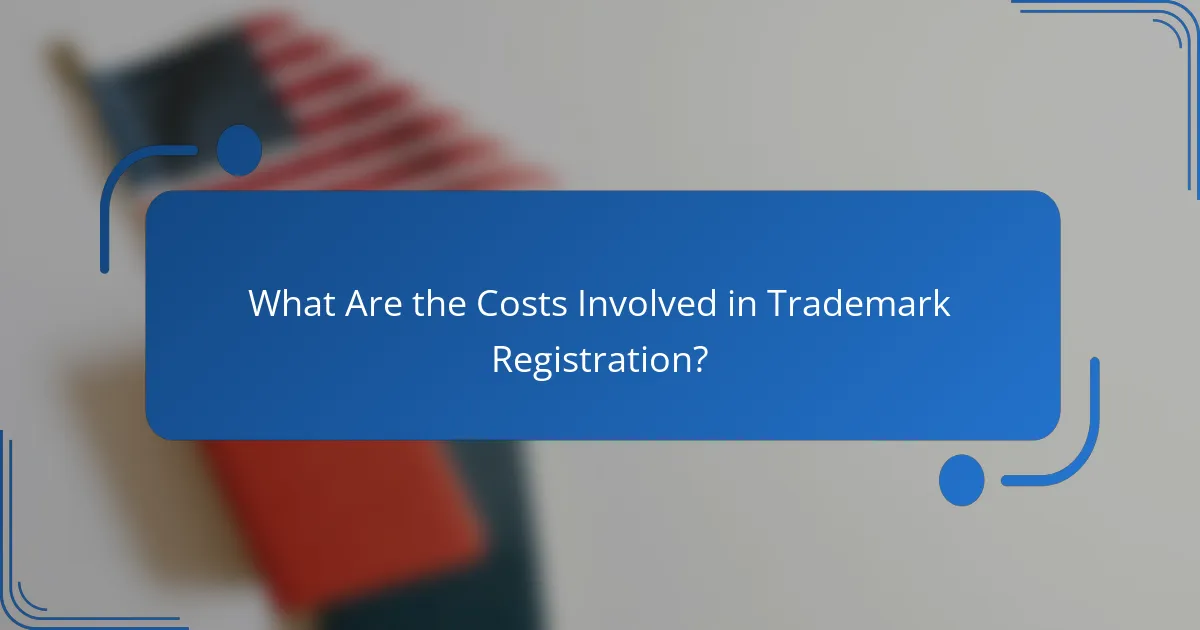
What Are the Costs Involved in Trademark Registration?
The costs associated with trademark registration can vary significantly based on several factors, including the service provider, government fees, and any legal assistance required. Small businesses should budget for these expenses to ensure a smooth registration process.
Service Fees Overview
When selecting a trademark registration service, businesses can expect to encounter service fees that typically range from a few hundred to over a thousand USD. These fees often depend on the complexity of the trademark and the level of service provided, such as whether the service includes a comprehensive search or ongoing support.
It’s advisable to compare different service providers and their offerings. Some may charge a flat fee, while others might have tiered pricing based on the services included, so understanding what each package entails is crucial.
Government Filing Fees
Government filing fees for trademark registration in the United States generally range from approximately $250 to $750 per class of goods or services. The fee structure can vary by country, so small businesses should check the specific requirements of their jurisdiction.
Filing electronically is often cheaper than paper submissions, and many countries offer reduced fees for online applications. Ensure you are aware of the classes your trademark falls under, as this will affect the total cost.
Additional Costs for Legal Assistance
Engaging a trademark attorney can add to the overall costs, with fees typically ranging from $200 to $500 per hour. Legal assistance can help navigate the complexities of trademark law, conduct thorough searches, and prepare the application to minimize the risk of rejection.
While hiring legal help is not mandatory, it can be beneficial for small businesses unfamiliar with the trademark process. Consider the potential costs of mistakes or rejections when deciding whether to seek legal assistance.
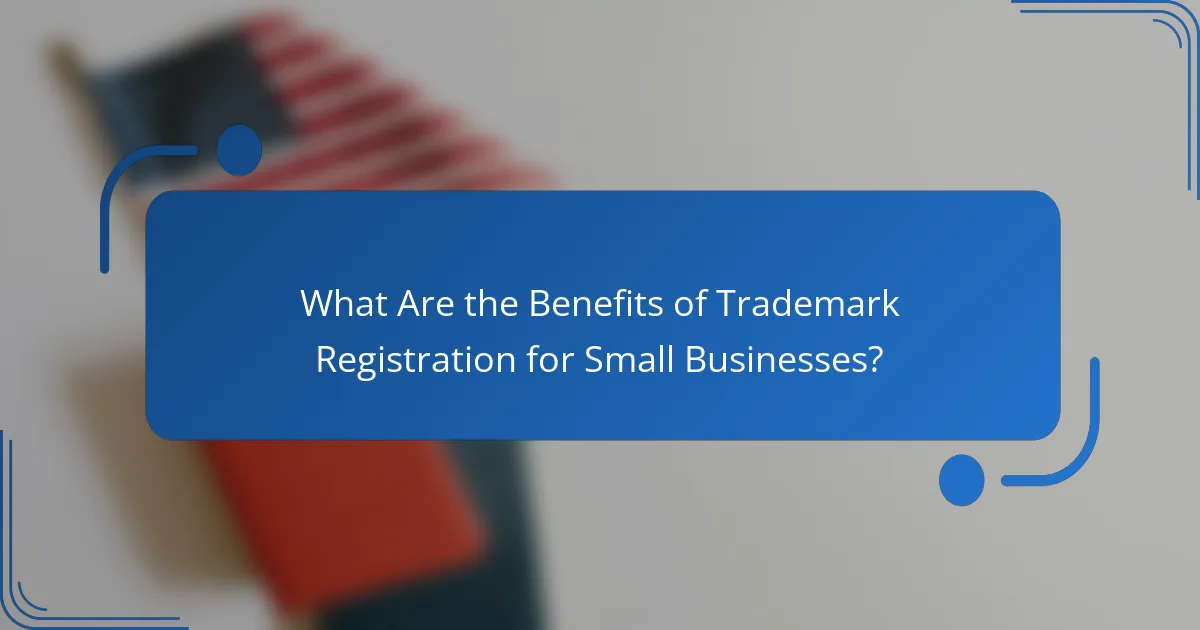
What Are the Benefits of Trademark Registration for Small Businesses?
Trademark registration offers small businesses essential advantages, including legal protection for their brand and enhanced credibility in the marketplace. By securing a trademark, businesses can safeguard their unique identity and prevent others from using similar marks that could confuse consumers.
Brand Protection
Registering a trademark provides robust brand protection by granting exclusive rights to use the mark in connection with specific goods or services. This means that competitors cannot legally use a similar name or logo, which helps maintain a distinct market presence.
Additionally, trademark registration serves as a public notice of ownership, deterring potential infringers. It is advisable for small businesses to monitor their trademarks actively to ensure no unauthorized use occurs, as this can undermine brand integrity.
Legal Rights to Use the Trademark
With trademark registration, small businesses gain legal rights that can be enforced in court. This includes the right to sue for damages if someone infringes on the trademark, which can be crucial for protecting a business’s reputation and financial interests.
Furthermore, registered trademarks can be renewed indefinitely, as long as they are in use and fees are paid, providing long-term security for the brand. Businesses should keep records of their trademark usage to support any legal claims if necessary.
Increased Business Credibility
Having a registered trademark enhances a small business’s credibility with customers, suppliers, and investors. It signals professionalism and a commitment to protecting the brand, which can lead to increased customer trust and loyalty.
Moreover, a trademark can be a valuable asset in attracting investment or partnerships, as it represents a recognizable brand that can contribute to a business’s overall value. Small businesses should consider promoting their trademark status in marketing materials to leverage this credibility.

What Are the Common Mistakes to Avoid in Trademark Registration?
Common mistakes in trademark registration can lead to delays, rejections, or loss of rights. Small businesses should be aware of these pitfalls to ensure a smooth registration process.
Not Conducting a Comprehensive Trademark Search
Failing to perform a thorough trademark search is a significant mistake. This step helps identify existing trademarks that may conflict with your application, potentially saving you time and money.
Utilize online databases and resources, such as the United States Patent and Trademark Office (USPTO) or the European Union Intellectual Property Office (EUIPO), to check for similar marks. A comprehensive search can help you avoid costly legal disputes later.
Choosing the Wrong Trademark Class
Selecting an incorrect trademark class can hinder your registration. Trademarks are categorized into classes based on the type of goods or services offered, and choosing the wrong one may lead to rejection.
Review the Nice Classification system, which categorizes goods and services into 45 classes. Ensure that your application accurately reflects your business offerings to avoid complications.
Ignoring the Importance of Distinctiveness
Trademark distinctiveness is crucial for successful registration. Marks that are too generic or descriptive may not qualify for protection, limiting your brand’s legal rights.
Aim for a trademark that is unique and memorable. Suggestive, arbitrary, or fanciful marks are generally more likely to be accepted. For example, “Apple” for technology is distinctive, while “Fresh” for fruit is not.
Overlooking Renewal Deadlines
Many businesses forget to renew their trademarks, leading to loss of rights. Trademark registrations typically require renewal every 10 years, depending on the jurisdiction.
Set reminders well in advance of renewal deadlines to ensure your trademark remains protected. Consider using a calendar or trademark management software to track these important dates.

